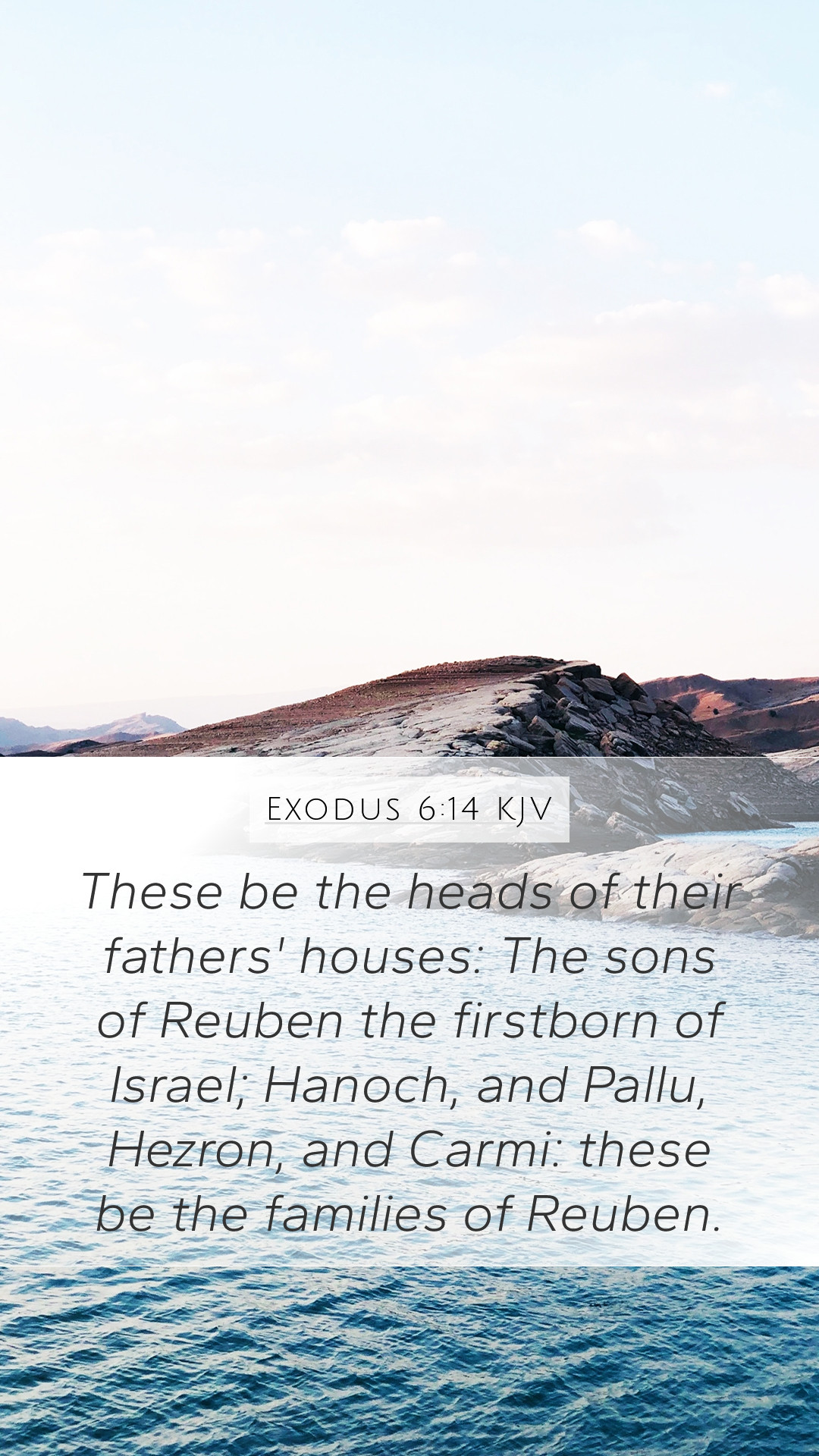Understanding Exodus 6:14: A Bible Verse Commentary
The verse Exodus 6:14 is a pivotal passage within the narrative of the Exodus, where God is revealing His covenant relationship with the Israelites and setting the stage for their deliverance from slavery in Egypt. Below is an amalgamation of insights from esteemed public domain commentaries, providing a comprehensive understanding of this verse.
Verse Text
Exodus 6:14: "These are the heads of their fathers' houses: The sons of Reuben, the firstborn of Israel: Hanoch and Pallu, Hezron and Carmi; these are the families of Reuben." (NKJV)
Commentary Insights
Matthew Henry's Commentary
Matthew Henry emphasizes that this verse serves to establish the genealogy of the tribes of Israel. It lists the sons of Reuben, highlighting the importance of family lineage in the Israelite culture. The mention of 'fathers' houses' signifies the patriarchal structure that was pivotal for the Israelites.
Albert Barnes’ Notes
Barnes notes that this genealogy functions not merely as a record of lineage but as a reminder of the promises God made to Abraham, Isaac, and Jacob. The mention of the tribes' leaders underscores God's faithfulness in preserving His covenant people, even in the midst of their bondage in Egypt.
Adam Clarke's Commentary
Clarke points out that the record of the families reflects God's interest in His people. Each name marks a story of God's providence and fulfillment of promises throughout generations. The importance of one's ancestry was crucial, laying claims not only to heritage but also to the promises associated with their forefathers.
Significance of the Verse
This verse not only serves as a historical record but also reflects upon several key themes pivotal to understanding Scripture:
- Covenantal Relationship: The genealogy reaffirms God's covenant promises made to the patriarchs.
- Identity and Heritage: The Israelites' identity is deeply rooted in their families, which is vital for their cohesion as a nation.
- Assurance of Deliverance: By recalling their ancestors and God's promises, the Israelites are reminded of their destiny as God's chosen people.
Applications for Today
Understanding Exodus 6:14 can be applied in various ways:
- Bible Study Groups: This verse can serve as a starting point in discussions about heritage and identity within faith communities.
- Online Bible Study: Use this verse to explore the genealogies found throughout the Bible, discussing their relevance to modern believers.
- Bible Study Tools: Implement genealogical studies into Bible study lessons to trace God's faithfulness through the ages.
Cross References
This verse has significant connections to other parts of the Scripture that delve into genealogies and God's covenant:
- Genesis 46:9-11: Lists the descendants of Jacob and emphasizes family lineage.
- Numbers 1:5-15: Also recounts the tribal leaders of Israel, reinforcing the importance of ancestry during their wilderness journey.
- Matthew 1:2-16: The genealogy of Jesus, linking Him to the heritage of the Israelites, showcasing the fulfillment of prophecies.
Conclusion
Exodus 6:14 is essential not just for its historical context but also for its lasting significance in teaching about God's enduring faithfulness and our identity in Him. Such reflections can foster a deeper understanding during Bible studies, offering insights into how God's plans span generations. This understanding can enhance both personal reflections and group discussions, encouraging believers to grasp the unfolding narrative of God's redemptive work.
Additional Resources
For further examination of this verse, consider exploring:
- Bible study resources focused on genealogies in the Old Testament.
- Bible study lessons that incorporate discussions about covenant relationships.
- Online courses that analyze historical contexts of pivotal Biblical passages.


